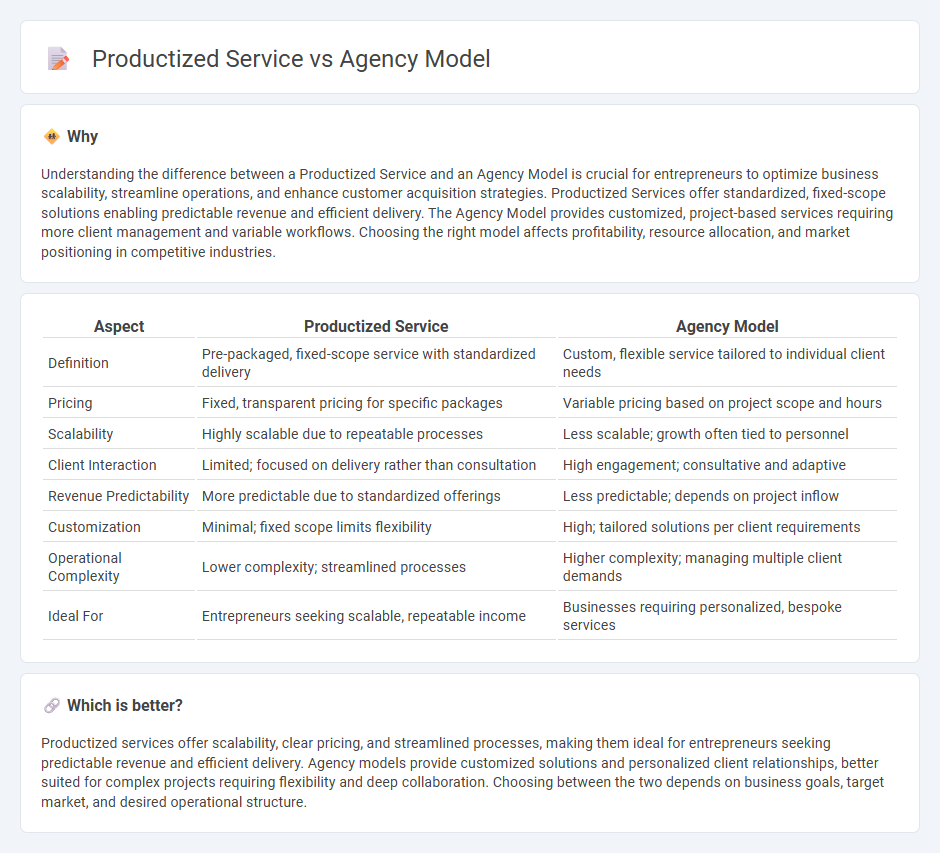
Productized services offer standardized solutions with fixed pricing, enabling scalable and efficient delivery for entrepreneurs. Agency models provide customized, client-specific services with flexible pricing, prioritizing personalized client relationships and tailored strategies. Explore how choosing between these models impacts business scalability and client engagement.
Why it is important
Understanding the difference between a Productized Service and an Agency Model is crucial for entrepreneurs to optimize business scalability, streamline operations, and enhance customer acquisition strategies. Productized Services offer standardized, fixed-scope solutions enabling predictable revenue and efficient delivery. The Agency Model provides customized, project-based services requiring more client management and variable workflows. Choosing the right model affects profitability, resource allocation, and market positioning in competitive industries.
Comparison Table
| Aspect | Productized Service | Agency Model |
|---|---|---|
| Definition | Pre-packaged, fixed-scope service with standardized delivery | Custom, flexible service tailored to individual client needs |
| Pricing | Fixed, transparent pricing for specific packages | Variable pricing based on project scope and hours |
| Scalability | Highly scalable due to repeatable processes | Less scalable; growth often tied to personnel |
| Client Interaction | Limited; focused on delivery rather than consultation | High engagement; consultative and adaptive |
| Revenue Predictability | More predictable due to standardized offerings | Less predictable; depends on project inflow |
| Customization | Minimal; fixed scope limits flexibility | High; tailored solutions per client requirements |
| Operational Complexity | Lower complexity; streamlined processes | Higher complexity; managing multiple client demands |
| Ideal For | Entrepreneurs seeking scalable, repeatable income | Businesses requiring personalized, bespoke services |
Which is better?
Productized services offer scalability, clear pricing, and streamlined processes, making them ideal for entrepreneurs seeking predictable revenue and efficient delivery. Agency models provide customized solutions and personalized client relationships, better suited for complex projects requiring flexibility and deep collaboration. Choosing between the two depends on business goals, target market, and desired operational structure.
Connection
Productized services streamline entrepreneurship by offering predefined, scalable solutions that enhance efficiency and predictability in client delivery. The agency model leverages these repeatable services to optimize resource allocation, improve profitability, and maintain consistent service quality. Integrating productized services into an agency framework accelerates growth by standardizing offerings and simplifying marketing strategies.
Key Terms
Revenue Structure
The agency model relies on hourly billing or project-based fees, generating revenue through client-specific work with variable income streams. In contrast, productized services offer predefined packages with fixed pricing, creating predictable and scalable revenue by standardizing deliverables. Explore the advantages and revenue nuances of each model to optimize your business strategy.
Customization
The agency model excels in customization by offering tailored solutions that adapt to specific client needs through personalized strategies and flexible service delivery. Productized services prioritize standardized processes and predefined offerings, delivering efficiency and scalability but with limited customization options. Explore the distinctive benefits and limitations of each approach to determine which best fits your business goals.
Scalability
Agency models often face challenges in scalability due to their dependence on individualized client relationships and customized deliverables, which require extensive human resources and time. Productized services enhance scalability by standardizing offerings, streamlining processes, and enabling automation, allowing businesses to efficiently serve a larger customer base with consistent quality. Explore the key differences and strategies to effectively scale your service business.
Source and External Links
Agency business model - AltexSoft - The agency model involves a team of specialized experts providing services to clients, acting as intermediaries (agents) rather than selling products; common in travel, marketing, HR, and more, it typically operates on commissions or fees for service delivered without owning inventory.
Merchant model vs. agency model: A guide for business success - In travel, the agency model means online travel agencies (OTAs) like Booking.com act as middlemen connecting travelers to service providers (hotels, airlines) without owning inventory or processing payments directly, earning commissions instead.
9 Marketing Agency Business Models for 2024 - Surfer SEO - Marketing agencies often use the agency model with different pricing structures such as retainer, project-based, or performance-based models where they charge clients for ongoing, project-specific, or results-driven services rather than product sales.
 dowidth.com
dowidth.com